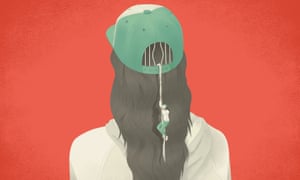
‘ I have spent decades building a toolkit of rituals, strategies and coping mechanisms that arm me against the challenges of adulthood.’ Illustration: Andrea De Santis/Observer
Because of our history, there has never been a stigma in my family about seeking help from an expert, including a psychotherapist, a life coach and a hypnotherapist
The word “antidepressants” was part of my vocabulary before I was 10. A number of adults in my family, including my mum, were long-term takers. From a young age, I knew what Prozac was and remember playing with the boxes of St John’s Wort tablets that were stacked by the telephone. An elderly aunt had been sectioned in Ireland decades earlier – and remained incarcerated until her death – for what, these days, would probably be diagnosed as bipolar disorder and treated far more sensitively.
“All the females in our family are crazy,” my father has always tenderly joked, even telling my serious boyfriends when I brought them home. It would have been funnier if there wasn’t a lot of truth in the statement. It’s an interesting situation when you grow up with the knowledge that mental illness runs in your family – especially the women. Wondering if every down day, every rough patch could be something else entirely – the beginning of your psychological inheritance.
Research shows that a range of contributing factors can lead to mental health problems, such as clinical depression. Genetics is partly to blame, alongside biochemical factors, illness, personality style, long-term pressures, such as workplace stress, and stressful or traumatic events.
Continue reading
I cannot afford the range of help that this writer uses but I’m not sure that they are entirely necessary so long as I have a really good support network.
No comments:
Post a Comment